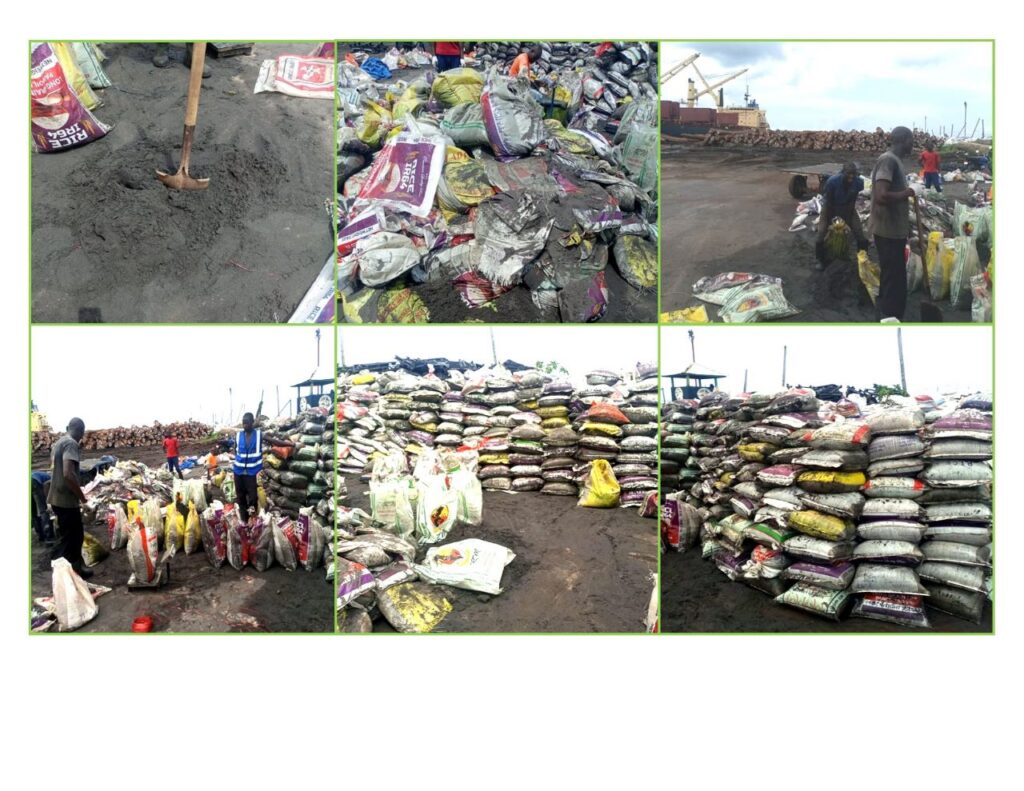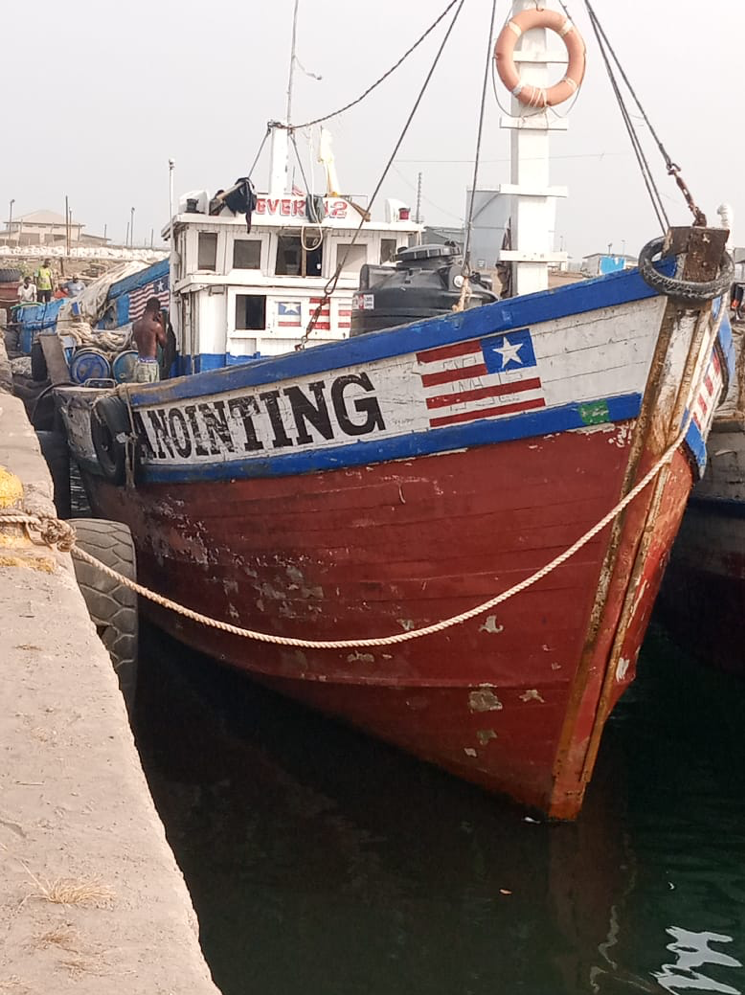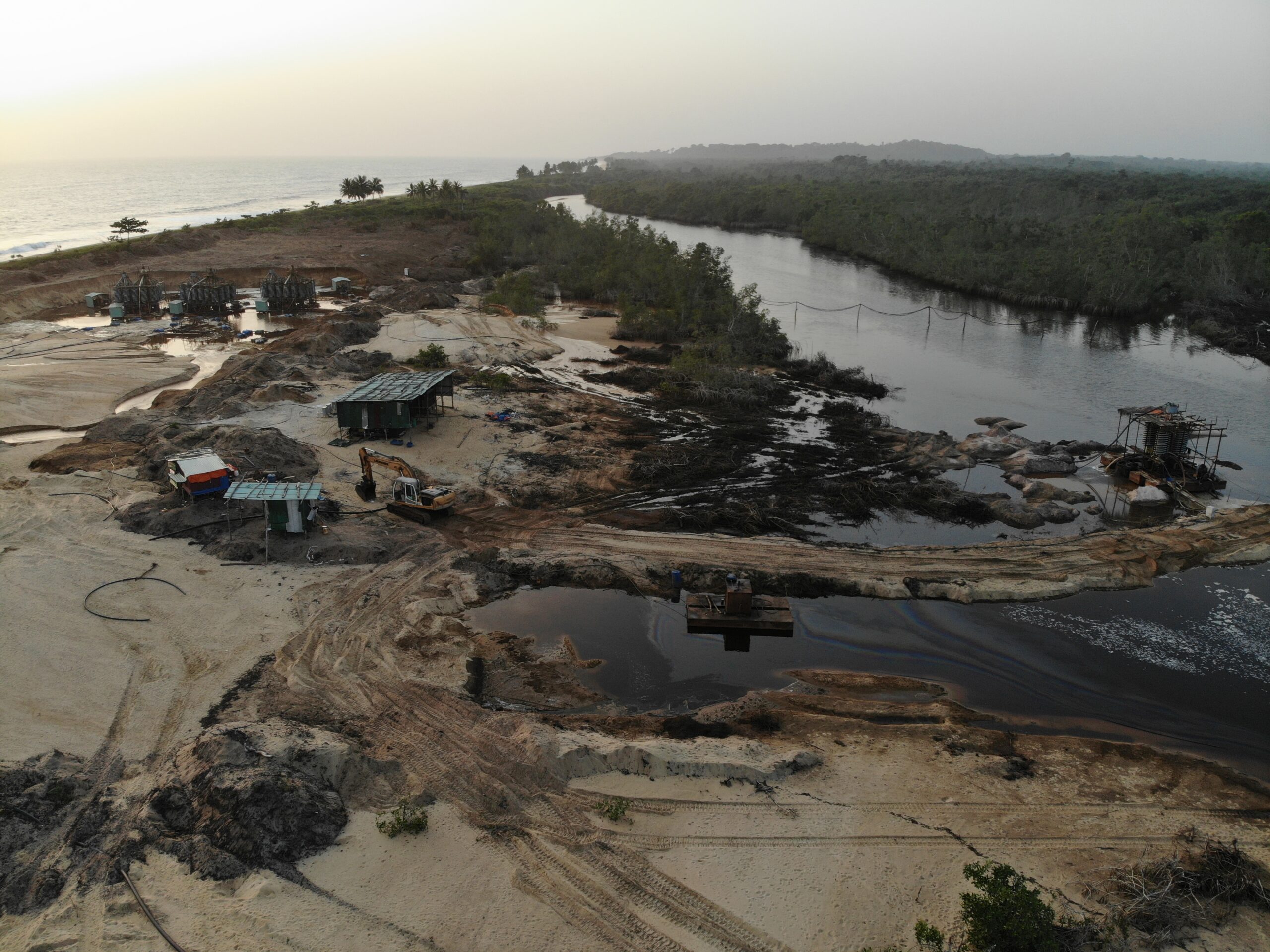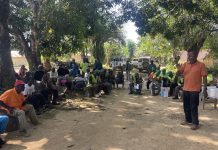Top: A drone shot of a zircon sand mine in Greenville, Sinoe. The DayLight/Derick Snyder
By James Harding Giahyue and Gerald C. Koinyeneh
MONROVIA; GREENVILLE – In late January, Representative Tibelrosa Tarponweh of Margibi County District Number One accused Liberia Mineral Export Inc. of violating a suspension of its mining operations in Marshall, Margibi County.
“This is causing [a] serious environmental hazard for our people,” Tarponweh told members of the House of Representatives at the time, requesting the body summoned the Minister of Mines and Energy Gesler Murray. “What we want is our people must be protected, irrespective of our individual financial interests. This company is operating illegally.” The House’s joint committee on mines, energy and environment, and judiciary is investigating the matter.
But an investigation by The DayLight found Tarponweh, too, co-owns a mining company with a Chinese national in Sinoe County. The lawmaker holds 15 percent shares in Jatoken Mining Inc., according to the company’s article of incorporation at the Liberia Business Registry. Tarponweh is also the firm’s registered agent, an individual who serves as a point of contact. Jianjun Huang, a Chinese national, holds the remaining 85 percent of the company’s shares.
Named after Tarponweh’s hometown in River Gee, Jatoken runs a semi-industrial-scare or a class B mine in the Sanquian District, records of the Ministry of Mines and Energy show. It also holds a gold dealership license and has held other licenses after Tarponweh became a lawmaker in 2017.
Interestingly, Jotoken mines zircon sand, the same mineral the Liberia Mineral Export is extracting in Margibi, which drew Tarponweh’s criticism. Moreover, Jatoken’s mine falls within Liberia Mineral Export’s 151-square-kilometer gold exploration license area, stretching from Butaw all the way to Sanquain along Bafful Bay. Both firms are two of at least four mining zircon sand, a black mineral used in the ceramics and electronics industries. STT Heavy Mineral Resources Ltd and Tetra Mineral Resources Limited complete the quadruple, based on the ministry’s online, public records.
Tarponweh’s ownership of the active company violates Liberian laws. The Minerals and Mining Law of 2000 bars lawmakers from holding shares in companies actively mining. The Liberian Constitution and the Code of Conduct for Public Officials also prohibit such a conflict of interest.
Tarponweh and Jianjun established Jatoken in May 2014, about the same time Tarponweh famously advocated for the rights of communities adjacent to a facility where Ebola victims were being cremated. That helped spur his ascendency to the House of Representatives, defeating 20 other candidates in a tight Margibi District Number Two race in 2017.
In an interview, Tarponweh claimed he did not know Jatoken was still operating after his election to the National Legislature.
“Your enquiry has opened up another investigation: I have just established that Mr. Jianjun Huang, who has 85 percent shares has been operating the company without my knowledge,” Tarponweh told The DayLight.

The ministry said Jatoken filed a new article of incorporation that removed Tarponweh as its shareholder just after he became a lawmaker. The document and the tax payment records show Tarponweh was replaced by Abdullah Mohammed on July 3, 2019.
“They brought a board resolution amending the shares distribution and their article of incorporation. They brought that with their business registration certificate,” said Assistant Minister for Mines Emmanuel Swen in a phone interview.
“With that, Tarponweh shares were transferred to another person. That shareholder resolution that they brought, Tarponweh name is on it with his signature affixed,” Swen added.
Tarponweh denies he signed any paper, accusing Jianjun of forging his signature. “My lawyer has taken charge of the situation. The action of Jianjun Huang is criminal. My name has been used to generate thousands of dollars,” Tarponweh said.
Swen said the Ministry of Mines would investigate if the Margibi legislator lodged a complaint. “If Tarponweh is not the one who signed, there is still a room,” Swen told The DayLight when asked about Tarponweh’s accusation. “He must [inform the ministry] that… his signature was forged. Then the ministry can act.”
‘Loopholes’
Jatoken did not register the change to its legal documents at the Liberia Business Registry, based on the Business Association Act. The law requires firms to enroll their legal documents within the registry and get a business registration certificate. It helps the government combat everything from conflict of interest and money laundering to tax evasion and terrorist financing.
Apart from the 2019 illegal amendment, Jatoken amended its article of incorporation once more on September 29, 2021, according to its tax payment record. Again, it did not file that change with the business registry. The Ministries of Mines and Foreign Affairs did not grant The DayLight’s request for a copy of that document.
Swen conceded that the ministry could have averted the Jotoken scandal had they checked with the Liberia Business Registry before honoring changes to Jatoken’s legal documents. The mining law requires the Ministry of Mines and Energy to verify the validity of firms’ documents before granting them mining rights.
“We have not been contacting the Liberia Business Registry to further investigate these documents,” Swen added. “We learn from some things that happened. You know the governance process is such that as you encounter one thing, you put into place measures to close the loopholes.”

Signature forged or not, the ministry awarded Jatoken a class B license on September 18, 2018, according to official records. That was nine months into Tarponweh’s legislative term and one year seven months before Jatoken unlawfully made changes to its shareholding. The mining law requires government officials with shares in companies to surrender their stakes or place them in a blind trust before assuming office. A blind trust controls public shares to avoid conflicts of interest.
Moreover, in his interview with The DayLight, Tarponweh claimed Jatoken was not mining zircon sand before he became a lawmaker. That claim is not backed by facts. Jatoken obtained a zircon sand prospecting license in 2015, the ministry’s official records show. The ministry awarded it a class B mining license for the mineral the following year and later archived it.
But Tarponweh’s shares are not Jatoken’s only eligibility issues. Foreign nationals must reside in Liberia and obtain resident and work permits in order to hold majority shares in a class B company, according to the mining law. Jianjun, Jatoken’s majority shareholder, has never obtained a resident or a work permit, the company’s tax payment records show. None of Jatoken’s foreign workers or representatives has obtained a work permit in nearly 10 years of the company’s existence. By law, the ministry should check companies’ owners, staff’s work and resident statuses, and financial history among other things, before awarding class B licenses.
It was unclear how much volume of zircon sand Jatoken has produced. However, between 2020 and 2022 the company paid just US$48,000 in mining-related fees, Liberia Revenue Authority (LRA) records show.
Our reporter who visited Jatoken’s mine in January saw a trail of equipment, including earthmovers and wheelbarrows. Sandbars and holes and mounds of zircon sand adorned the area. Workers bagged the mineral and transported it to Buchanan, Grand Bassa via boats. Some of the boats that transport the mineral are “Anointing,” “God Knows” and “Iron State.”
Photographs taken at the Port of Buchanan show men uploading 25-kilogram bags with zircon sand. One port source said workers pack 50 bags of the mineral in a single container. Another source said workers transport scores of containers with the mineral to the Freeport of Monrovia weekly.
Jatoken did not return questions for comments on this story. We contacted three of the company’s representatives between February 26 and early this week. Earlier this month, a female representative promised to comment once she returned to Monrovia from Sinoe. She stopped responding to calls and WhatsApp messages ever since.
[Mark Newa and Johnson Buchanan contributed to this story]
Funding for the story was provided by the Green Livelihood Alliance (GLA 2.0) through the Sustainable Development Institute (SDI). The DayLight maintained complete editorial independence over the story’s content.





Facebook Comments